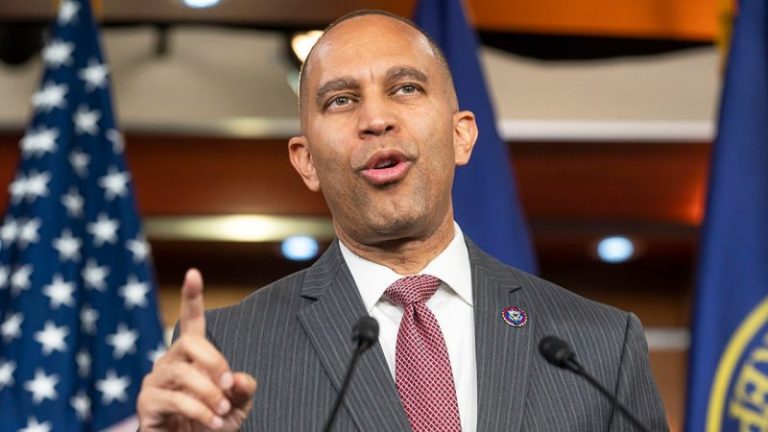The incoming chair of the Democratic Congressional Campaign Committee (DCCC) already has a long list of challenges, but one of them is dealing with a political staff that has unionized, which some say could impact the party’s goal of regaining control of the House in 2024.
Over the past year, three major campaign committees that work to elect Democrats to Congress — the DCCC, the Democratic Senatorial Campaign Committee (DSCC) and the Democratic National Committee (DNC) — all voted to unionize.
Senate Majority Leader Chuck Schumer, D-N.Y., has yet to name a new chair for the DSCC, which is currently led by Michigan Democrat Sen. Gary Peters. But incoming House Democratic Leader Hakeem Jeffries of New York has tapped Washington Democrat Rep. Suzan DelBene to replace outgoing DCCC head Rep. Sean Patrick Maloney, D-N.Y.
The move from Jeffries will have to be ratified by the full Democratic Caucus, but placing the selection itself in the party leader’s hands is a new development. Since 2016, the caucus as a whole voted to elect the DCCC chair.
The decisions at the three Democratic committees to unionize have brought into question whether issues could arise at the DSCC and DCCC as the incoming leaders work to implement their own agendas and potentially make staff changes.
Mark Mix, president of the National Right to Work Committee, a 2.8 million-member public policy organization, told Fox News Digital that the Democratic campaign committees ‘are about to get an up close and personal look at the ugly reality of coercive unionism’ and that the votes to unionize by each committee could have serious ramifications.
‘What will they do when a one-size-fits-all monopoly union contract forces them to fire a great worker because they choose not to fund a union?’ Mix said. ‘Or when the union rules protect the worst employees at the expense of the best, driving the most productive ones to find employment elsewhere? Or, perhaps, when they are forced to retain the staff of a previous regime that should be replaced for the very ineffectiveness that led to the turnover in leadership? Or when, in the run-up to Election Day, union bosses make sweeping demands backed up by a threat to strike?’
Mix insisted the decisions made by each committee to unionize were part of an ‘effort to display their forced unionism bona fides and to cozy up to the Big Labor officials who fund their campaigns.’
‘Union affiliation should be the voluntary decision of every worker, not forced on them against their will by union officials or by an employer as part its virtue signaling and fundraising,’ he said. ‘That said, the campaigns these committees support nearly uniformly seek to foist a union on every business and worker in America, like it or not, and use the power of the federal government to do it. So in their dealings with their own union, I can only offer them the best of luck.’
Similarly, Josh Kraushaar, a senior political correspondent for Axios and a Fox News contributor, said the unionization of the committees could put Democrats at a ‘competitive disadvantage’ against Republicans ahead of the 2024 presidential elections.
‘Campaign work typically requires long hours for low pay — with most jobs demanding maximum flexibility at a moment’s notice,’ Kraushaar told Fox News Digital. ‘It’s not the type of work that’s conducive to bureaucratic requirements and regulations. Democrats run the risk that by unionizing campaign work, they will be at a competitive disadvantage against their rivals.’
‘Even Bernie Sanders’ presidential campaign initially resisted paying its staff a $15 minimum wage, as the senator called on all businesses to do,’ he added.
Despite concern from others who believe the vote to unionize could pose a threat to Democrats going forward under new leadership, a spokesperson for the DCCC, who noted the committee must follow certain notice and severance obligations, said its union contract allows for staffing adjustments between cycles that are based on business needs and to focus on strategic priorities.
In August, the DCCC Staff Union — which is represented by Teamsters Local 238 — announced the ratification of its first collective bargaining agreement, which included ‘extending 100% employer-paid health insurance to staff,’ as well as ‘raising wages to reflect the value of DCCC employees’ and ‘rewarding employees who bring valuable language expertise to the committee.’
‘DCCC is proud to have a strong union that protects workers — it’s a core Democratic value,’ said DCCC spokesperson Chris Taylor.
‘Together with our union partners, we developed a contract that recognizes the nature of our organization and best positions us to capture a Democratic House majority.’

